Photos of university / #kyotouniversity
Management of Civil Infrastructure at Kyoto University is a comprehensive graduate program dedicated to developing experts capable of planning, designing, constructing, maintaining, and improving critical civil infrastructure systems. This program aims to equip students with advanced knowledge and practical skills necessary to address the complex challenges associated with the sustainable development and management of urban and rural infrastructure networks, including transportation, water supply, sewerage, bridges, tunnels, and other vital structures. Emphasizing a multidisciplinary approach, the program integrates principles from civil engineering, environmental engineering, urban planning, and management sciences to foster innovative solutions for current and future civil infrastructure issues. Students engage in rigorous coursework covering structural analysis, construction management, risk assessment, and infrastructure resilience. Additionally, the program encourages research activities that contribute to the development of smarter, safer, and more sustainable infrastructure systems, harnessing cutting-edge technologies such as IoT, big data analytics, and digital twins. Collaboration with industry partners and participation in real-world projects are integral components, providing practical experience and fostering professional networks. Graduates of this program are prepared to take leadership roles in infrastructure development, policy formulation, maintenance strategies, and technological innovation within public and private sectors. Recognized globally for its academic excellence, Kyoto University’s Management of Civil Infrastructure program aims to cultivate professionals who will play key roles in shaping the resilient and sustainable infrastructure landscape of the future.
Common Subject
| 10D051 | Frontiers in Modern Science & Technology |
| 10i045 | Exercise in Practical Scientific EnglishⅠ |
| 10i046 | Exercise in Practical Scientific EnglishⅡ |
| 10K005 | Advanced Modern Science and Technology(English lecture) |
| 10K001 | Introduction to Advanced Material Science and Technology(English lecture) |
| 10i041 | Professional Scientific Presentation Exercises(English lecture) |
| 10i042 | Advanced Engineering and Economy(English lecture) |
| 10i047 | Engineering Project Management Ⅰ(English lecture) |
| 10i048 | Engineering Project Management Ⅱ(English lecture) |
| 10i009 | Internship |
| 10F251 | Exercise on Project Planning |
| 10U055 | Seminar on Infrastructure Engineering A |
| 10U056 | Seminar on Infrastructure Engineering B |
| 10U059 | Internship on Infrastracture Engineering |
| 10F063 | Practice in Infrastructure Engineering |
| 10F003 | Continuum Mechanics |
| 10F067 | Structural Stability |
| 10F068 | Material and Structural System & Management |
| 10F261 | Earthquake Engineering/Lifeline Engineering |
| 10W001 | Infrastructural Structure Engineering |
| 10F009 | Structural Design |
| 10F010 | Bridge Engineering |
| 10A019 | Concrete Structural Engineering |
| 10F227 | Structural Dynamics |
| 10F263 | Seismic Engineering Exercise |
| 10F415 | Ecomaterial and Environment-friendly Structures |
| 10F089 | Infrastructure Safety Engineering |
| 10F075 | Hydraulics & Turbulence Mechanics |
| 10A216 | Hydrology |
| 10F019 | River Engineering and River Basin Management |
| 10A040 | Sediment Hydraulics |
| 10F464 | Hydrologic Design and Management |
| 10F245 | Open Channel Hydraulics |
| 10F462 | Coastal Wave Dynamics |
| 10F267 | Hydro-Meteorologically Based Disaster Prevention |
| 10A222 | Water Resources Systems |
| 10F077 | River basin management of flood and sediment |
| 10F269 | Coastal and Urban Water Disasters Engineering |
| 10F466 | Basin Environmental Disaster Mitigation |
| 10F011 | Computational Fluid Dynamics |
| 10F065 | Hydraulic Engineering for Infrastructure Development and Management |
| 10F100 | Applied Hydrology |
| 10F103 | Case Studies Harmonizing Disaster Management and Environment Conservation |
| 10F106 | Integrated Disasters and Resources Management in Watersheds |
| 10F025 | Geomechanics |
| 10K016 | Computational Geotechnics |
| 10F238 | Geo-Risk Management |
| 10F241 | Construction of Geotechnical Infrastructures |
| 10F405 | Fundamental Geofront Engineering |
| 10A055 | Environmental Geotechnics |
| 10F109 | Disaster Prevention through Geotechnics |
| 10F203 | Public Finance |
| 10F207 | Urban Environmental Policy |
| 10F219 | Quantitative Methods for Behavioral Analysis |
| 10F215 | Intelligent Transportation Systems |
| 10A805 | Remote Sensing and Geographic Information Systems |
| 10A808 | Civic and Landscape Design |
| 10F223 | Risk Management Theory |
| 10X333 | Disaster Risk Management |
| 693287 | Disaster Information |
| 10A845 | Theory & Practice of Environmental Design Research |
| 10A402 | Resources Development Systems |
| 10F053 | Applied Mathematics in Civil & Earth Resources Engineering |
| 10K008 | Computational Mechanics and Simulation |
| 10A405 | Environmental Geosphere Engineering |
| 10F071 | Applied Elasticity for Rock Mechanics |
| 10F073 | Fundamental Theories in Geophysical Exploration |
| 10F087 | Design of Underground Structures |
| 10A420 | Lecture on Exploration Geophysics |
| 10F085 | Measurement in the earth's crust environment |
| 10F088 | Earth Resources Engineering |
| 10X311 | Urban Infrastructure Management |
| 10F113 | Global Survivability Studies |
| 693291 | Emergency Management Systems |
| 10F201 | Information Technology for Urban Society |
| 10Z001 | Urban Transport Policy |
| 10Z002 | Policy for Low-Carbon Society |
| 10Z003 | Urban Transport Management |
| 10F380 | Engineering Seminar for Disaster Resilience in ASEAN countries |
| 10F382 | Disaster and Health Risk Management for Liveable City |
- Must have graduated, or be expected to graduate from a Japanese university (excluding Undergraduate School of Global Engineering, Faculty of Engineering, Kyoto University) by March 31, 2017
- Must have completed, or be expected to complete 16 years of school education by March 31, 2017
- Must have completed 15 years of school education in a foreign country and must be recognized by the Graduate School of Engineering, Kyoto University as having earned specified credits with excellent grades
- Must be qualified by means of an individual entrance examination by the Graduate School of Engineering of Kyoto University, must be judged to have academic ability equivalent or superior to a university graduate, and must be at least 22 years of age by March 31, 2017
- Certificate of Graduation (or Expected Graduation) and Transcript of Academic Record
- Application Fee ¥10,000, Admission Fee ¥ 282,000, Tuition ¥535,800 /year
- TOEFL (or IELTS, TOEIC)
Funding for the Management of Civil Infrastructure program at Kyoto University typically encompasses several components, including tuition fees, scholarships, and financial aid options. International students are generally required to pay tuition fees, which are comparable to those of other advanced graduate programs at the university. Kyoto University offers a range of scholarships aimed at supporting international students, such as the Japanese Government (MEXT) Scholarships, which cover tuition, a monthly stipend, and sometimes travel expenses. Additionally, the university provides its own scholarship programs, such as the Kyoto University International Undergraduate and Graduate Student Scholarships, as well as research assistantships and teaching assistantships that can offset living and study costs. Eligibility for these scholarships often depends on academic achievement, research proposal quality, and financial need.
Students are encouraged to actively seek external funding opportunities, including government scholarships from their home countries, international organizations, and private foundations. The university's financial aid office provides comprehensive guidance on available funding sources and application procedures. It is important for prospective students to prepare strong application materials and meet scholarship deadlines to maximize their chances of receiving financial support. Moreover, Kyoto University participates in exchange programs with partner institutions worldwide, which sometimes include agreed-upon financial arrangements or fee waivers for exchange students.
Living costs in Kyoto can vary depending on lifestyle, but students should budget for housing, food, transportation, and health insurance. Some students choose to live in university dormitories or shared housing to reduce expenses. Overall, the management of civil infrastructure program is supported by a combination of university funding, external scholarships, and personal financial planning, ensuring that motivated students from diverse backgrounds can pursue their studies without undue financial hardship.
Management of Civil Infrastructure at Kyoto University offers a comprehensive education and research opportunity for students interested in the planning, design, construction, maintenance, and management of civil infrastructure systems. This program emphasizes the integration of engineering principles with management strategies to ensure the sustainability, safety, and efficiency of infrastructure such as transportation networks, water supply systems, sewage and drainage facilities, and public utilities. Students are provided with a multidisciplinary approach, combining structural engineering, environmental considerations, operational management, and policy-making processes to prepare them for leadership roles in infrastructure development and maintenance.
The curriculum includes courses on infrastructure planning and policy, risk management, project management, environmental impact assessments, and innovative construction techniques. Emphasis is placed on addressing current challenges such as aging infrastructure, climate change impacts, and urbanization pressures. The program also encourages practical training through internships, field surveys, and collaborative projects with industry partners, aiming to equip students with real-world experience that bridges theoretical knowledge and practical application.
Research activities within the program focus on developing sustainable infrastructure solutions, improving construction methods, and implementing smart infrastructure systems using digital technologies like IoT and AI. Faculty members are leading experts in civil engineering and infrastructure management, actively publishing in international journals and participating in global research initiatives. Students are encouraged to participate in these research projects, fostering an environment of innovation and collaborative learning.
Postgraduate students can pursue master's and doctoral degrees, with options for specialization in areas such as urban infrastructure management, transportation engineering, water resources management, and disaster risk reduction. The program attracts a diverse international student body, offering courses in English and Japanese to facilitate global engagement.
Graduates of the program are well-prepared for careers in government agencies, private consulting firms, construction companies, research institutions, and international organizations working toward sustainable development and resilient infrastructure systems. Overall, the Management of Civil Infrastructure program at Kyoto University combines cutting-edge research, practical skills, and management expertise to cultivate professionals capable of shaping the future of civil infrastructure worldwide.






